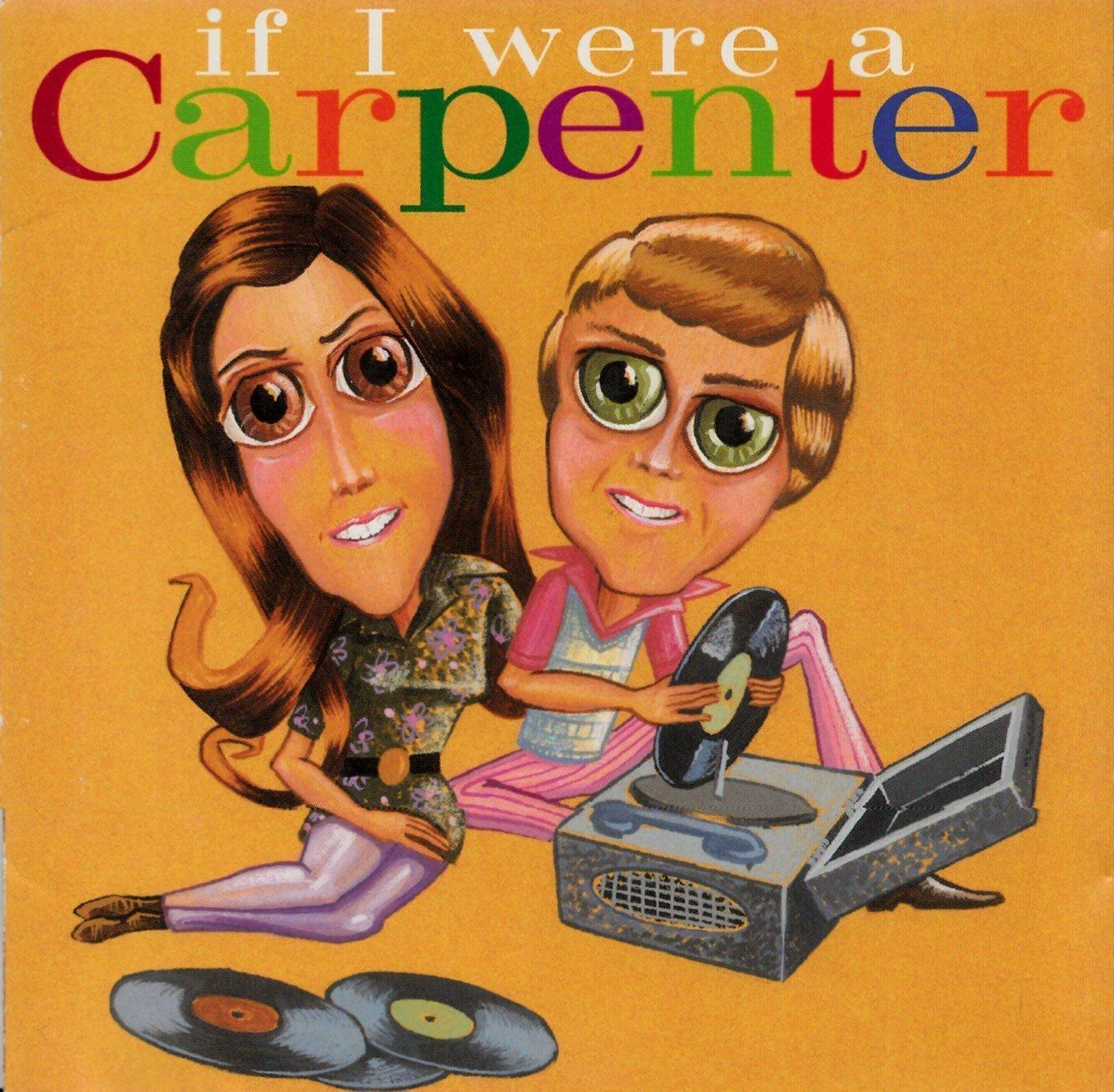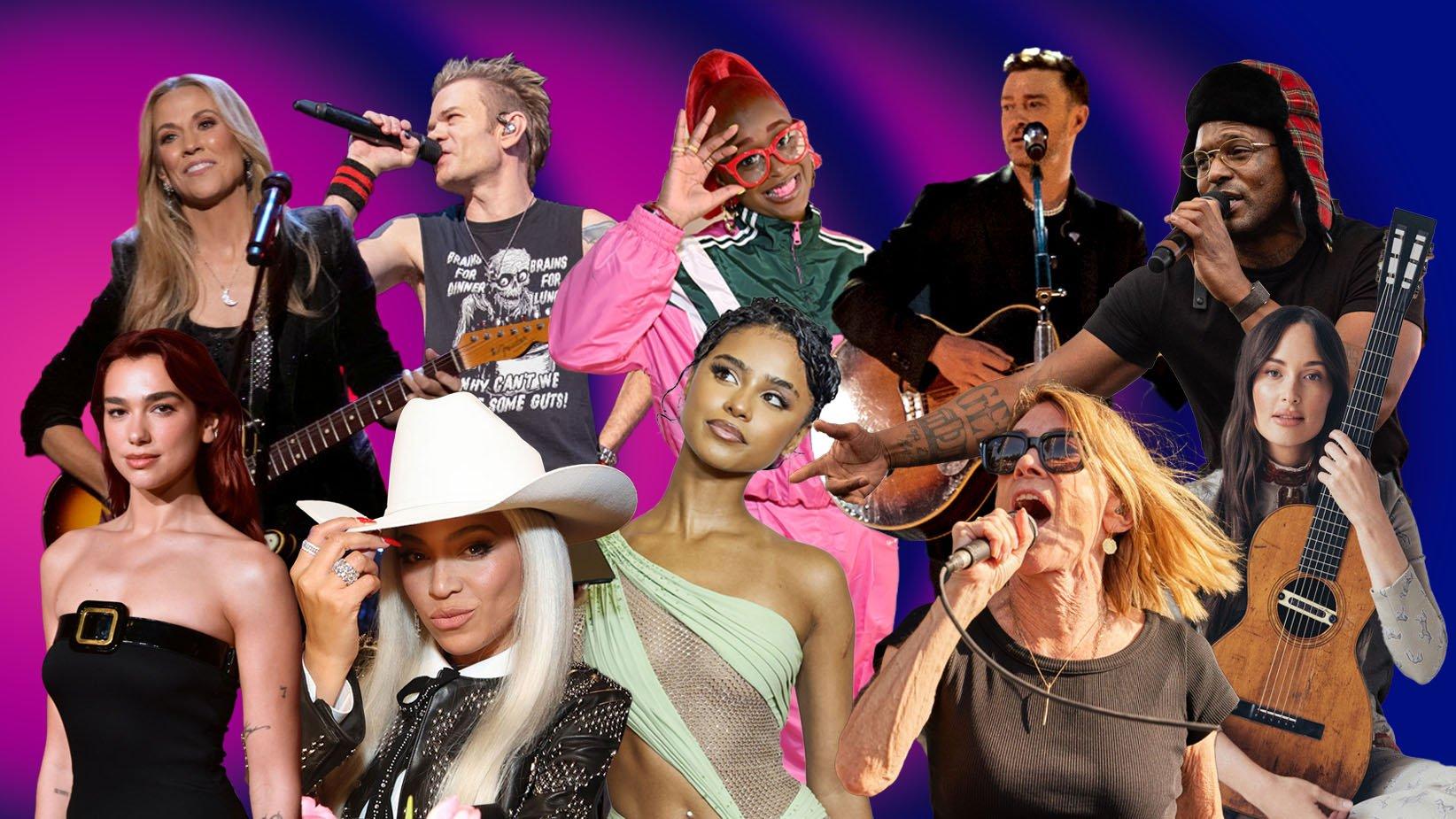In popular culture, the cyclical adage "Everything old is new again" is often embodied in the form of the tribute album—an unwieldy vehicle of veneration whose success lies as much with the source material as with those interpreting it. A tribute album’s chances of hitting that sonic sweet spot are also enhanced when it follows the loosely structured (and hotly debated) 20-year nostalgia cycle—the idea that one’s generational fads of music, fashion, technology, books, slang and other cultural touchstones resurface after a couple decades (give or take) of mainstream dormancy. With its roster of 1990s alternative music rabble-rousers celebrating the 1970s clean-cut, musical prodigy duo The Carpenters, the left-of-center tribute album If I Were A Carpenter wonderfully delivers on these concepts in spades.
This month marks 25 years since the release of If I Were A Carpenter, providing a nice echo of its origins, as the tribute album was initially conceived as a commemoration of the 25th anniversary of The Carpenters' debut album, Offering. On its surface, the idea of rowdy alt-rockers running bubbly Carpenters songs through cranked guitars and buzzy amplifiers might've seemed like nothing more than a tongue-in-cheek goof. As KROQ’s music director Darcy Fulmer said of the album at the time, "It shows that people who like alternative music liked dork music when they were little, too."
However, the story behind If I Were A Carpenter involves no winks or chuckles. In fact, it's downright irony-free. It was a labor of love hatched by two longtime friends, Matt Wallace and Dave Konjoyan, who bonded over their love of the exemplary music crafted by the sibling duo of Karen and Richard Carpenter. Both ended up working in the music industry—Dave as a music journalist and Matt as a record producer—and when they first started working on the idea for a Carpenters tribute album, they ended up wrangling a disparate group of alternative artists, punk bands and college-rock crooners who all seemed to share in their genuine affinity for The Carpenters' inescapably infectious pop perfection.
To salute two-and-a-half decades of the If I Were A Carpenter tribute album (as well as 50 years of The Carpenters' own musical magic), the Recording Academy conducted an oral history featuring the album's co-producers Matt Wallace and Dave Konjoyan, legendary songwriter (and Carpenters collaborator) Paul Williams, and many of the artists involved, including Matthew Sweet, Johnette Napolitano, Grant-Lee Phillips, members of The Cranberries, Cracker, Dishwalla and more.
<iframe width="620" height="349" src="https://www.youtube.com/embed/6B1g_X7kED4" frameborder="0" allow="accelerometer; autoplay; encrypted-media; gyroscope; picture-in-picture" allowfullscreen></iframe>
Matt Wallace (co-producer): Dave and I met in Physical Education class in high school and became friends after we bonded over singing Carpenters songs in the locker room one day. It wasn’t the smartest thing to do at that moment in time because there was probably no quicker way to get your ass kicked in high school during the 1970s, other than to maybe sing Barry Manilow songs. Fast forward to the early '90s, Dave brought up the idea of this tribute record to me because I had produced some big records for Faith No More and The Replacements, as well as a few bands on A&M Records, which The Carpenters had been on. We pitched it to A&M and thankfully got the greenlight.
Dave Konjoyan (co-producer): I was doing some music journalism at the time and I was noticing a lot of artists were expressing appreciation for The Carpenters, especially for Karen's voice. It was artists like Chrissie Hynde, k.d. lang, Sonic Youth, Babes In Toyland and a few others. Tribute albums were also starting to really become a bigger thing, so I thought there might be enough artists interested in doing one dedicated to The Carpenters.
Matt Wallace (co-producer): The contrast of the impeccably arranged, glossy pop of The Carpenters with bands that were a little scrappier and less refined is what made it so interesting. You look at "Goodbye to Love" by American Music Club or "Superstar" by Sonic Youth or "Rainy Days And Mondays" by Cracker and you get these dark readings of the songs that feel really aligned with how Karen was singing them and how she was probably feeling at the time. Though, to flip that, some of the bands also did really well at turning in brighter versions of what The Carpenters did, like the beautiful version of "Close To You" by The Cranberries and "Top of the World" by Shonen Knife.
Dave Konjoyan (co-producer): A&M might've been interested in us pursuing a more mainstream group of artists, but from the beginning the concept for Matt and I was always the alternative band route. A lot of bands on the record—Sonic Youth, Sheryl Crow, The Cranberries, Babes In Toyland—are ones that we really targeted right from the beginning. We got a lot of artists agreeing to it right of the bat.
Matt Wallace (co-producer): We also had a couple bands—Smashing Pumpkins, Paul Westerberg, Stone Temple Pilots—that were really on board but just didn't work out due to scheduling conflicts or various other reasons. But I'm super pleased with all of the bands who participated and how it all turned out. I mean, Sonic Youth liking The Carpenters? That was mind-blowing to most people at the time.
<iframe width="620" height="349" src="https://www.youtube.com/embed/E1X59-t9PMQ" frameborder="0" allow="accelerometer; autoplay; encrypted-media; gyroscope; picture-in-picture" allowfullscreen></iframe>
All throughout the 1990s, there was a seemingly constant rotation of alt-friendly tribute albums dedicated to popular '70s artists: Kiss (1994's Kiss My Ass), Led Zeppelin (1995's Encomium), John Lennon (1995's Working Class Hero) and The Clash (1999's Burning London), just to name a few. There were even a couple alt-heavy tribute albums playfully dedicated to 1970s television, including 1995's Saturday Morning: Cartoons' Greatest Hits and 1996's Schoolhouse Rock! Rocks. Released in the fall of 1994, If I Were A Carpenter was certainly on the front end of that wave, an important note that helps contextualize the album's peculiar subject matter, its assorted roster and its unquestionably raucous-yet-reverent tone.
David Lowery (Cracker): When I first heard about the opportunity of being a part of a Carpenters tribute album, I thought it was kind of odd and cool. Like, who is thinking about The Carpenters right now? Stacked up against some of the other tribute records of the time, The Carpenters seemed like a much less obvious choice and that made it more interesting to us. They were one of my guilty pleasures that weren't exactly in vogue in the early '90s.
Matthew Sweet: The Carpenters were kind of omnipresent when I was a kid. You heard them whether you were seeking them out or not. Both Karen and Richard were so talented and their catalog provided such a wealth of material for this tribute record to pull from.
Fergal Lawler (The Cranberries): I thought The Carpenters were great. They made fantastic, heartfelt songs that still sound great today. They were actually really big in Ireland. We definitely heard them on the radio all the time, especially "Close To You."
Naoko Yamano (Shonen Knife): Since I'm Japanese and can't understand their English lyrics very well, it was their sound that really reached my mind. But that was enough because their melody lines and Karen's vocals were so attractive to me. Their song "Sing" was in one of our school textbooks, so I thought that their music was only for good children. My friends liked them, though.
Johnette Napolitano (Concrete Blonde): I was so happy to be able to be a part of this record because The Carpenters absolutely owned AM radio during my junior high and high school years. Richard's certainly a talented arranger, but for me it was really all about Karen. Karen’s voice was so incredibly soulful and totally made for radio. You hear a hundred voices when you hear her sing. Plus, she could really play the drums, which is not something you saw women doing at the time.
J. R. Richards (Dishwalla): The Carpenters were cool because there was such a weird, darker tinge underneath all of the beautiful background vocals and lovely sentiments. I really liked the juxtaposition they brought to their songs.
Mark Eitzel (American Music Club): When we first got asked to be involved, I was like "Absolutely, I love The Carpenters!" They made incredible records. For all the schlock that you would hear on the radio at the time, they never offended me. Their songs were so well written, perfectly arranged, and just sung so beautifully.
Grant-Lee Phillips (Grant Lee Buffalo): For me and for so many other bands of that era, The Carpenters were the music of our childhood. The '70s were a mixed bag. It was the age of the superstar and it was gaudy. There was a strange patriotic flair juxtaposed against scandal and violence. Yet, here was this duo trying to breakthrough with some light in a very bizarre and clouded era. I vividly remember being a kid and riding around in the car with my mom singing along to The Carpenters. They were really close to me, no pun intended.
<iframe width="620" height="349" src="https://www.youtube.com/embed/Q_benmP9I3o" frameborder="0" allow="accelerometer; autoplay; encrypted-media; gyroscope; picture-in-picture" allowfullscreen></iframe>
On the combined strength of Richard's instrumental prowess and Karen's soulful three-octave contralto (as well as her complex, skilled drumming), The Carpenters released 14 studio albums and over 40 singles—many of which attained platinum-selling status and reached the top of the charts in multiple countries. Their biggest Billboard Hot 100 hit singles—"(They Long To Be) Close To You," "We’ve Only Just Begun," "Rainy Days And Mondays," "Superstar," "Top of the World," "Please Mr. Postman"—charted in the early '70s, but the sibling duo released albums, produced television specials, and remained a fixture on Top 40 radio all the way up until Karen’s untimely death in 1983 from anorexia-induced heart failure. As The Carpenters legacy has continually been reassessed over the years, it is Karen’s emotionally resonant vocals that remain the summit of their many creative talents.
Johnette Napolitano (Concrete Blonde): Karen was really something special and she just gave everything she had. She was a fragile wick that just burned herself all the way down and didn’t say no to anything. She was almost sacrificed in a way, but out of that came some of the most beautiful music to ever be recorded.
Paul Williams (songwriter): The wonderful thing about the way Richard produced their albums was that with everything going on in the track—instrumentation, orchestration, the background harmonies—there was never anything that threw a shadow on Karen. Her vocals were kept front and center so you could experience the emotion they carried and the elegance of her voice that was such a hybrid of melancholy, sensuality and sadness.
Grant-Lee Phillips (Grant Lee Buffalo): Karen's voice was so gorgeously unique, the way she sang in that lower register. This tribute album is interesting because Karen had died just a little over a decade before and that strange grief was still somewhat in the air. It actually gave me some pause because I didn’t want to be disrespectful in any way.
Matt Wallace (co-producer): Karen's voice was one of the most incredible instruments of pop music ever. Her tone and her control were incredible, but it was also the subtext—that anybody who has ever had any feelings of melancholy or has been down, can really connect to it. As much as Richard tried to polish and create so much gloss and sheen to the instrumentation, the emotional resonance in her voice hit so deep and would not be denied.
<iframe width="620" height="349" src="https://www.youtube.com/embed/rPk50ohrXQg" frameborder="0" allow="accelerometer; autoplay; encrypted-media; gyroscope; picture-in-picture" allowfullscreen></iframe>
When it came time for the bands involved to pick which Carpenters song they were going to perform, there was surprisingly little drama. While this could be somewhat expected from an artist's catalog as deep and rich as The Carpenters, it also speaks to the varied musical tastes of the bands paying tribute. Some artists like Matthew Sweet, Grant-Lee Phillips and The Cranberries delivered performances fairly true to the originals, while other artists like 4 Non Blondes, Babes In Toyland, Bettie Serveert and Sonic Youth took decidedly broader creative liberties. Others found a contrasting middle ground between the slick pop craftsmanship of the originals and their own sonic predilections.
Paul Williams (songwriter): Songs are not written in cement. They're just a starting place to bring your own emotions and express your own feelings through your own interpretations.
Matt Wallace (co-producer): I love that most of the bands shifted towards the brooding, melancholy side of what The Carpenters did. Richard and Karen were more than just the bright, shiny, effervescent side of what they are sometimes most remembered for. Most of the bands were pretty flexible because we asked everyone to pick two or three songs. That way we could make sure to hopefully get at least one of their picks. Some of the bigger artists like Sheryl Crow or The Cranberries might’ve been able to pick theirs a little earlier.
David Lowery (Cracker): I knew everyone was going to want to do "Superstar," but I've always loved "Rainy Days And Mondays." I’d like to say we were musical geniuses by discovering the beauty in giving it an even more down tempo groove, but what you hear on the recording is actually a take where we’re still learning the song. Bob Rupe, who was playing bass for us then, was walking us through the chord progression really slowly as we figured everything out. Mark Linkous from Sparklehorse was sitting in with us, just listening along and throwing a couple guitar lines in here and there. I think we also tried a more upbeat, alternative take on it that didn’t work as well. So, we went back to this warm-up take, added some strings and background vocals to it a couple weeks later, and it became this weird accidental hybrid that we just loved.
Naoko Yamano (Shonen Knife): We were shown two or three songs to cover and I firmly picked "Top of the World." There was no other choice for me. I really love that song and the melody lines are perfect.
"Songs are not written in cement. They're just a starting place to bring your own emotions and express your own feelings through your own interpretations."
Fergal Lawler (The Cranberries): We picked "Close To You" and we were delighted when they said it was still available. I remember I had just heard a cover version of Smashing Pumpkins doing Thin Lizzy's "Dancing In The Moonlight" and I really loved their slowed down version of it, so I suggested we try it that way. I remember when Dolores [O'Riordan] was recording her vocals, she didn’t want to sing the line "They sprinkled moondust in your hair" because she thought it sounded a bit spacey. She felt a bit embarrassed about it, so she wanted to just kind of mumble her way through that part.
Johnette Napolitano (Concrete Blonde): I was really hoping to get "Superstar" because I was really close with Leon Russell, who was one of the song's co-writers. I was pissed when Thurston [Moore] got it because it's a singer's song and he blows. But Marc Moreland and I had a lot of fun recording "Hurting Each Other." All the girls wore "Karen" nametags and all the guys wore "Richard" nametags. We rented concert chimes—the huge, six-foot tall brass tube kind that you hit with a hammer. That was when you could still smoke indoors, so I have this vivid memory of Marc Moreland in a cloud of smoke just banging on the concert chimes through all the guitar craziness at the end of the song.
Matt Wallace (co-producer): I recorded Sheryl Crow doing "Solitaire" in Los Angeles because I was having to catch her between shows while she was touring in and out of Europe. I remember it took us three different studio sessions to get the exact vocals we wanted for her. For one of those sessions, she flew in from Germany, threw her bags down in her apartment, and came directly to the studio to sing. She's probably the hardest working person I've run into in this business and I’m such a fan of what she did on that somber version of "Solitaire."
Peter Visser (Bettie Serveert): We did "For All We Know" and in retrospect, I think my guitar is a bit over the top, too desperate to make a "rock song" out of it. For the ending, I thought the song could use some cowbells, so in the lobby of the studio we found an aluminum lemon squeezer, put it on a piece of rope, and beat it with a fork. I think Carol did a great job with the singing. Her voice sounds really close and warm in the verses and goes full on in the choruses.
Carol van Dyk (Bettie Serveert): After recording all the music, we came up with the idea to have me lying flat on my back on the floor in the middle of the studio. They hung the microphone right above my face and the guys placed little tea lights around me and turned off the studio lamps to create a nice soft atmosphere. Unfortunately, we didn’t have a camera with us, so no pictures.
J. R. Richards (Dishwalla): Recording "It's Going to Take Some Time" was officially the very first thing we did after getting signed to A&M. The tribute album was already in motion, like most of the bands had already picked songs and were in the process of recording them. In fact, we actually recorded a full demo of "Close To You" to show them that we wouldn’t do a sh*tty job. When we took it to A&M to show them, we were told it had already been picked by another band. So, we took a shot at "It’s Going To Take Some Time" and tried to take it to a different rhythmic place. We speed it up quite a bit because we didn’t want it to sound too sweet. I played the original keyboard intro on a Wurlitzer right at the beginning and then we took it off into its own journey.
Mark Eitzel (American Music Club): We just wanted to approach "Goodbye To Love" really simply with no key changes and no orchestration or anything. Just a simple band vibe. All the way up until the final mixes our producer was trying to get me to re-record my vocals because he thought Richard wasn’t excited about the idea of people recording his songs in a bastardized way. Like, Richard’s already made them perfect, so why would you want these messy rockers to spoil the perfection? Nowadays I would’ve worked my ass off to make it perfect, but back then I was just a young idiot. I think the track turned out really great though.
Grant-Lee Phillips (Grant Lee Buffalo): Our version of "We've Only Just Begun" is a little more reverent to the original because we were really struck by the musical architecture of the song. We studied how it was put together and tried to be true to it. It was a natural thing for me to interpret it by singing it a bit higher and trying to meet Karen's vocal in the middle.
Dave Konjoyan (co-producer): I remember there being such a sense of excitement about every track as they came in. From our conversations with the bands, my impression was that they were all doing it from a heartfelt place. They certainly all brought their personalities to their tracks and they all seemed to have some affinity for the music and for The Carpenters as artists.
<iframe width="620" height="349" src="https://www.youtube.com/embed/hSPuexh7_mg" frameborder="0" allow="accelerometer; autoplay; encrypted-media; gyroscope; picture-in-picture" allowfullscreen></iframe>
Deep into the project, Wallace and Konjoyan ended up getting the ultimate seal of approval, as Richard Carpenter agreed to sing and play on one of the tracks. Matthew Sweet had requested Richard’s participation on his true-to-form adaptation of "Let Me Be The One" (a syrupy ballad from the quadruple-platinum Carpenters album from 1971) and somewhat surprisingly to most everyone involved, he agreed.
Matthew Sweet: It was my request to see if we could find him and get him to play on it. At the time, I had this 1970s Dodge Challenger and he had a huge car collection that was in a big building in an office park. He took me out there to see it, which was really cool. He was super nice to me and seemed really supportive of doing the track.
Matt Wallace (co-producer): From the beginning, we knew we wanted to get Richard on board, but we also knew we were limited in regards to which artists he would fit with and feel comfortable. I think he wanted to make sure he wasn't straying too far from the legacy of The Carpenters and he didn't want to do a disservice to what he and Karen had so carefully built.
Dave Konjoyan (co-producer): I was there at the studio the day Matthew and Richard recorded "Let Me Be The One" and I remember them having a great time doing it. I think Richard felt appreciated. It was a really great moment for Matt and I to get to bring these different musical worlds together on the album and it really came together in that moment in the studio.
<iframe width="620" height="349" src="https://www.youtube.com/embed/rPk50ohrXQg" frameborder="0" allow="accelerometer; autoplay; encrypted-media; gyroscope; picture-in-picture" allowfullscreen></iframe>
If I Were A Carpenter was officially released on September 13, 1994. A split single between Redd Kross's "Yesterday Once More" and Sonic Youth's "Superstar" was released to radio, and the music videos of both tracks got substantial airplay on MTV. Dishwalla even got to perform "It's Going To Take Some Time" on the short-lived late-night talk show The Jon Stewart Show. Rolling Stone called the album "affectionate, almost reverent" and Entertainment Weekly had a listening party with Richard to get his thoughts, from Sonic Youth ("I love it. From the heart. It's quite haunting") to Shonen Knife ("I like the energy, but they've left out a couple of chord changes"). But what did those involved with the project think about each other's tracks?
Grant-Lee Phillips: Reverence can come in many packages.
Matt Wallace (co-producer): Once we got all of the tracks back and heard that the arc of the record was leaning a little more somber, we knew that we wanted to start the record off with American Music Club's "Goodbye To Love." Then, Shonen Knife's "Top of the World" became the perfect follow-up track because it's so upbeat and effervescent. They beat The Carpenters at their own game on that one.
Naoko Yamano (Shonen Knife): I love Redd Kross so much and Jeff McDonald's vocals on "Yesterday Once More" are really great!
Dave Konjoyan (co-producer): I really liked what Cracker did with "Rainy Days And Mondays." It was certainly a different interpretation than the original, but it was very fitting for who they are as a band.
Grant-Lee Phillips (Grant Lee Buffalo): I most enjoyed The Cranberries take on "Close To You" and the way Dolores delivered the lyrics in her way of bending the notes and just wrapping them around her finger.
Paul Williams: I love David Lowery's singing on "Rainy Days And Mondays" and the way those strings roll in about midway through. Initially I thought it may have been a little tongue-in-cheek, but I love how they totally made it their own. I really believe him when he sings "What I got they used to call the blues."
J. R. Richards (Dishwalla): Shonen Knife's "Top Of The World" is just completely out there and fun. Sonic Youth's "Superstar" is also amazing. It's just so harrowing.
Fergal Lawler (The Cranberries): I really enjoyed the Sonic Youth track. That one stood out the most to me when we listened to the whole thing.
Peter Visser (Bettie Serveert): My favorite is "Superstar" by Sonic Youth because Thurston Moore sings it so beautifully. I really liked the music video with the golden microphone as well.
Paul Williams (songwriter): The wonderful thing about listening to Thurston sing "Superstar" is that it's totally believable. That one feels so much like it's about Karen. You really get the sense of remembering her and missing her in his performance. It's just marvelous.
Matt Wallace (co-producer): At the time, the most forward-leaning track was Dishwalla's "It's Going To Take Some Time" because of that blending of loops and real drums. It feels like five years ahead of its time. They were the only band on the tribute that hadn’t already released an album but we just really liked them.
<iframe width="620" height="349" src="https://www.youtube.com/embed/oz_hZAoQNTU" frameborder="0" allow="accelerometer; autoplay; encrypted-media; gyroscope; picture-in-picture" allowfullscreen></iframe>
While the last 25 years has seen If I Were A Carpenter serving double duty as an authentically celebratory tribute to the legacy of The Carpenters and also a telling sonic snapshot into the unaffected, unpretentious side of '90s alternative music, the album does have one nagging (albeit trivial) piece of unfinished business: as of yet, there's no 12" LP vinyl version of the record. Although the tribute did get an original-run vinyl release as a boxset of seven 7" singles (a very nostalgically appropriate approach in itself), vinyl collectors have been clamoring for a full-size 12" LP for years, hoping for either a label-sponsored vinyl debut reissue or even a limited-run Record Store Day exclusive offering.
Matthew Sweet: I remember they did a bunch of 7" singles but it never got the full 12" record treatment. In the '90s, you weren’t guaranteed vinyl at all. So that was kind of a special and unusually cool way to release it.
Carol van Dyk (Bettie Serveert): A while back somebody asked us if we had a spare Carpenters tribute vinyl boxset. We had to disappoint them, but I totally understand why they wanted one, it’s such a cool thing to have as a fan.
David Lowery: When I became a thrift store loving college kid in the '80s, Carpenters records were always an interesting novelty to come across. It’d be nice to see this album get that treatment too.
Jenny Lewis On Loving L.A., Texting With Beck & Why 'On The Line' Is Just "One Piece Of The Puzzle"
Dave Konjoyan (co-producer): That’s a little bit of a sore spot. Physically, the record's been out of print for years but I think it would be really great if they ever put out a full vinyl version. I'd really love to see it.
Matthew Sweet: To finally get a full vinyl pressing of it would be a no-brainer for something like Record Store Day. Somebody's got to make that happen! That would really bring the whole tribute full circle.





